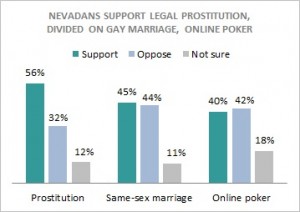bestessayhelp.com
Legalized Prostitution – Essay Sample
Opposition Argument
No matter how potent the arguments are for the benefits in legalizing prostitution, they cannot compensate for one fact: that, from a deontological standpoint, both participants are behaving in what is, at best, a morally questionable way. The morality and ethical codes of any society may be flawed, but they set the standards by which morality itself can be known. In modern cultures around the world, monogamous marriages are the ideal. These are in turn based upon prized ethical values, in that trust and commitment are the civilizing agents to which men and women aspire. It is understood by these men and women that this ideal is not necessarily easy, and it typically requires the sacrifice of many personal gratifications, sexual and otherwise. This, however, is also what imbues the tradition with value. Self-denial for the sake of the family unit is a widely esteemed ethic which is believed to generate greater rewards for the individual, the family, and the society as a whole.
Running completely contrary to this, then, would be the government of the society legalizing prostitution. In the legalization must come a kind of endorsement, and this is virtually impossible to justify in deontological terms. What it translates to, in fact, is a sort of compromise, wherein the government acknowledges the moral damages of prostitution, but nonetheless allows it because the practice remains prevalent. To legalize prostitution may be defensible in regard to many issues, such as crime influences and controls, health matters, and revenue considerations, but these potential advantages are removed from the moral core of the practice. Simply put, even the most profitable and well-regulated immoral activity must always be basically immoral, and even the eliminating of many of the horrors involved in illegal prostitution does not change the nature of the act, or sexual transaction, itself.
Consequentialism is often turned to as a solid rationale for legalizing prostitution, but much of this is hopeful speculation, and by no means established fact. For instance, the involuntary recruiting of prostitutes, very often minors, occurs everywhere within the Unites States. It is estimated that tens of thousands of children are annually trafficked into the business because their vulnerability permits it (Mooney, Knox, Schacht 122). This component alone provides a strong argument against the inherent morality at the core of the activity. Clearly, the welfare of those unwillingly forced into the business is not a concern by those exploiting them, and there is little reason to believe that legalization would enhance the moral commitments of those capable of so victimizing others. Legalizing the activity may only curtail the abuse and/or recruiting of minors into the field; that is to say, it is likely that the greater profits from illegal prostitution will still be a temptation within a society where the trade is legal.
Then, consequences of legalization do not encompass or alleviate the damage created by illegal prostitution. The costs of legalized prostitution in moral terms cannot be eliminated by the sanctions. The man or woman who employs the prostitute is channeling resources away from his or her family, and a society that values trust and monogamy as foundations for marriage is severely weakened by the permitting of it (Spector 399). The obvious must be kept in mind: prostitution is an act that has traditionally been illegal because it defies moral precepts. It reduces sex to a commercial transaction, which must demean both prostitute and client. The potentially beneficial aspects to legalizing it are utterly removed from this single, inescapable reality. Prostitution is wrong in deontological terms because the motivations for it are simultaneously born from greed and physical lust, and this may be asserted without any dependence on religious foundations. To legalize it would be to imbue morally incorrect desires and actions with a transparently false appearance of morality.
In Favor of Legalizing Prostitution
It is dangerous to take a Kantian perspective on legalized prostitution because, very simply, issues involving sexual morality itself have gone through enormous shifts over time. There is no moral absolute in this regard because the viewpoints of cultures radically change, and a great deal of what was once considered outrageously wrong sexual behavior is, today, accepted as normal. To assert that there is a consistent, definable good or evil motivation behind anything regarding sex is to miss the point, because the only morality attached to sexuality is that shifting one which the society applies to it. This goes to the heart, then, of legalizing an activity which is centered on the purchase of sex.
In a very real sense, only a consequentialist point of view applies to this issue. For example, a major argument against any form of prostitution is that it is harmful, and in many ways, to women. Virtually all research indicates that women are far less likely to support legalized prostitution, as they feel it debases and exploits females (Carroll 531). This prevalent feeling, however, is itself a consequence, and not a moral imperative within the issue. Women are demeaned by prostitution because society has established sexuality itself as a defining agent of their being. It could be argued, in fact, that the criminalization of prostitution debases women because it relies on an ethical code which attaches a completely inappropriate moral quality to their sexuality. That is to say, a woman is cheapened by selling sex because, in society’s view, her sex is a valuable commodity beyond the physicality of it, and one by no means entirely at her disposal to provide. If she sells it, she is debased; if she offers it in marriage, she is “good”. In both cases, what matters is that she remains subjected to external moralities, and moralities which also do not eliminate the commercial aspect, but simply reinterpret it.
A powerful stand against prostitution has also always revolved around the very real and physical dangers, primarily to women and minors. Legalizing the activity would most probably, and vastly, lessen these factors. In Hamburg, Germany, streetwalking prostitutes are confined to certain areas of the city. More importantly, governmental regulations require that prostitutes undergo medical check-ups, and women with contagious diseases are absolutely barred from the profession (Flowers 157). Add to this the fact that decriminalization would protect female prostitutes from the violence inflicted by their procurers. When these assets are then examined, what occurs is that the deontology of the issue suddenly becomes relevant. Female prostitutes, safe from danger and protected by the government, are empowered to be the whole human beings current society refuses to allow them to be. The morality changes because the unnecessary and ugly effects of the criminalization are removed, and prostitution then becomes nothing but a choice of career.
Furthermore, there is no telling how far legalizing prostitution may go in accomplishing what society has thus far been unable to achieve: a true equalizing of men and women. If women have been demeaned as having to “resort” to the depths of illegal prostitution, the legal form will immeasurably enhance the status of the gender because women will at last have true control over how their sexuality is perceived and employed. Legalizing prostitution renders not only the organized crime behind it powerless, but also all the means by which society still traps women into classifications based on how they exercise their sexuality. Then, there is the further leveling aspect of a legalized market wherein men are permitted to safely work as prostitutes. This must produce as a consequence a beneficial, if at first startling, evolution in the morality of male and female relations. As sexuality is never an inherently moral activity or thing, both men and women would then be freed to view real morality as removed from it. It is ironic, but legalizing prostitution should actually go a long way toward a far more valid sense in the society of what truly is good or bad, because, and for both sexes, an irrelevant complication will be at last removed.
…
bestessayhelp.com
bestessayhelp.com

